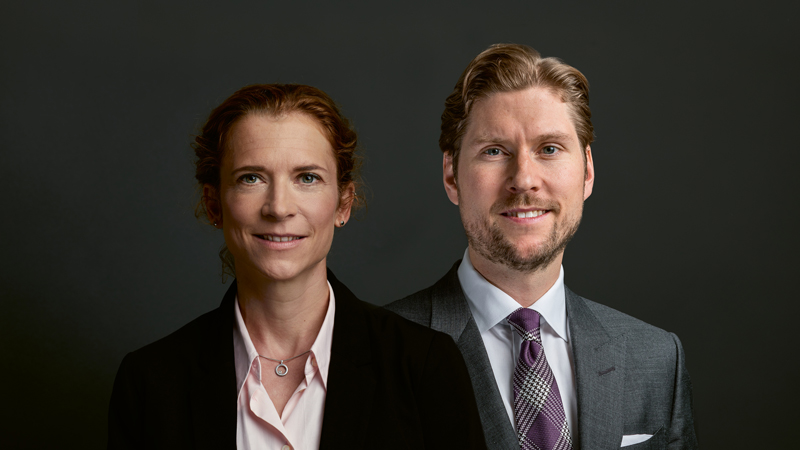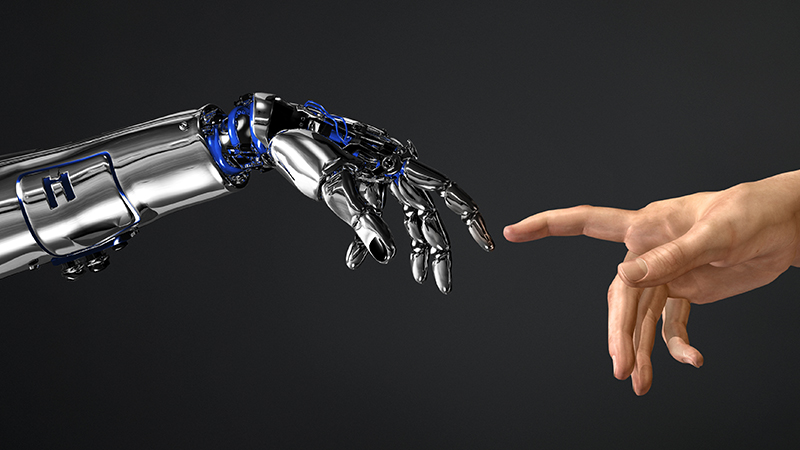Leadership in the vortex of digitization
An interview with Nicole Brandes, Management Coach and Partner of the Zukunftsinstitut (the "Future Institute")
Digitization has ushered in some crazy times. Algorithms tell us what we should buy, whom we should recruit and even whom to flirt with on Tinder. We are drowning in data. What do leaders need to keep in mind that, so that with all the digital transformation going on, their companies don’t neglect the human aspect of success?

Nicole Brandes, Management Coach and Partner of the Zukunftinstitut
One thing we cannot digitize: the real relationships between people. In earlier times, we used to be born into communities and had to find our individuality. Today, we’re born as individuals and are able to hyper-individualize everything. But despite all the fascination with technology, humans are, and remain, creatures that are analog through and through. And our needs are still like they were thousands of years ago. In order to satisfy our longing for real encounters, real relationships and real friendships, today we have to search for belongingness. What we need in this vortex of global digitization is the ability to establish common ground. Across all boundaries, generations and genders.
"The global society that we are all growing into is full of clashing values and thus rife with the potential for conflict."
In our interview with Nicole Brandes, read about the new challenges this presents for leaders – and why we need to arm ourselves emotionally to be able to translate the new wisdom of diversity into success.
Nicole Brandes, as an international management coach, you advise the powerful and influential people of this world. On your own career path, who coached you the most?
I am always able to learn, and I never want to stop learning. In every phase of my life, I’ve had new and different experiences, and that makes it difficult to say that I learned the most from this particular client or that particular assignment. Today, what’s more important is that, even at the peak of your career, you’re prepared to learn. And it doesn’t matter whether you’re learning from well-established individuals or freshly hired employees with new, innovative ideas.
As a partner of the Zukunftsinstitut, you deal every day with the changes that the future will usher in. Doesn’t this give you some anxiety?
I'm optimistic about the future, but I don’t look at everything through rose-colored glasses. Digitization is going change a lot, and not everyone is going to be able to come to terms easily with a future and an environment that is so technology-driven. That's why it's so important to me that with all this digital transformation going on, we don’t lose sight of the human aspect. Because it’s human relationships that hold our society together, not the conducting path on some computer chip.
How can you manage in an inspirational way? Is that learnable and teachable?
Yes, that's learnable. I’m an advocate for being able, first, to manage yourself, to develop inner strength within the chaos going on around us, and not allowing external forces to determine who we are so much as allowing your own strengths to come to the fore. That's why my coaching work with executives is primarily in the area of self-management.
How do you achieve this self-management?
First of all, it's about having a personal vision, developing your own philosophy, and recognizing what drives you – and what slows you down. If you yourself know where you want to go and why you do what you do, and you see the meaning in what you do, then you’ll be able to enthuse and inspire other people. Then they will follow where you lead because they want to, not because they have to. When it come to leading people, it’s not your credentials that matter, but your personality. Discovering, nurturing and protecting your personality will enhance your professionalism and, ultimately, your personal wellbeing as well.
"When it come to leading people, it’s not your credentials that matter, but your personality."
What are the most important changes that digitization is bringing about?
Digitization – also referred to as "Industry 4.0" – is changing EVERYTHING! How we live, how we work, how we do business, even how we love. Already now, it’s possible to have sensors implanted in our bodies that send data directly to the doctor. We can design our own personal virtual assistants, and attend meetings as holograms. That's why it's so important to learn how to assert yourself in a complex and rapidly changing environment.
Are human beings built to deal with all these upheavals, coming one after another, faster and faster?
Humans are hard-wired to perceive change as a danger. In that sense, we will have difficulties with it. But on the other hand, we are also very resilient beings, capable of learning, and it’s with upheavals that we grow, becoming more mature and innovative. Dealing with uncertainties and complexity will be a critically important capability to have in the future. However, we can’t prepare for that by cramming knowledge, as if for an exam. These are capabilities that you have to gain through experience. And at first, it’s natural that it will make you feel uncertain.
What does "Industry 4.0" demand of leaders?
Almost heroic abilities are demanded of executives. You need to be able to manage within all the leadership models, because we live in an age of real-time action, with all the borders coming down. That's why executives can no longer manage strictly by the numbers, but increasingly by assuming the role of visionaries and inspirers. To do this, they have to advocate values that employees can identify with. This helps them orient themselves, gives them meaning and a sense of belonging. Work models of the future will be very flexible on the one hand, and at the same time provide stability. The classic department manager will eventually be replaced by team members continuously changing their roles.
"Executives will increasingly assume the role of visionaries and inspirers."
How can managers in leadership positions make the most of their employees' potential? And awaken new potential within them?
Above all, executives can create spaces for experimentation. We can no longer master the complexity all alone. This means trusting employees, believing in their potential and allowing it to unfold. That is very demanding! To achieve success, creativity and teamwork are the important skills that will make a difference in the future, not so much whether you did an MBA, and where.
You like to talk about the wisdom of diversity. How can leaders promote this wisdom?
We live in a multi-dimensional society made up of a mix of cultures, genders, ages and experiences. If you can tap into this knowledge, you will be at an advantage. The wisdom of diversity means we must allow many ideas to be generated so that employees think outside their box – and also that they learn to do so. To do this, we need more and more of these famous people skills. I would like to see those skills cultivated early on.
Within at most ten years, Millennials will make up the majority of the entire labor force. How should companies prepare themselves for this cohort?
The best way to do this is to hire, involve and promote them early on. And, above all, you need to begin to make a more intensive effort to understand them. Every generation has its own preferences and ways of life, and we are going to have to adapt the way we work to these differences. I don’t see that as a big problem as long as you – as a company and above all as an entrepreneur – go through the world with your eyes open and don’t dwell on past successes.
About Nicole Brandes
Nicole Brandes is a Management Coach for international companies, author and partner of the Zukunftsinstitut with Matthias Horx. She can look back on nearly two decades of international management experience in a number of well-known enterprises. Today, her work is dedicated to meaningful and value-centered leadership, because especially given today’s increasing digitization, the longing for "why" is increasing more and more.
Who are we? How do we live today? And how will digitization change our lives? How the future will unfold is preoccupying society more than ever, with engineers, doctors, politicians – each one of us, in fact – seeking answers. This interview with Nicole Brandes is one of many contributions that shed light on the theme "Digitized Societ" from a new, inspiring perspective. We are publishing them here as part of our series "Impact".
Our great sense of curiosity at Vontobel means we are attentively following scientific research in many key areas. This helps us recognize new investment opportunities early on. That's why our thematic portfolios and thematic investments also reflect megatrends such as digitization, as we consider companies that are making valuable contributions to solving global challenges.
I am interested in Vontobel thematic investments
I am interested in Vontobel funds








